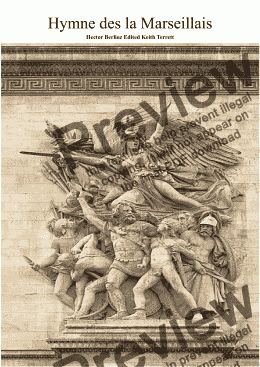Ready to print
You have already purchased this music, but not yet printed it.
This page is just a preview and does not allow printing. To print your purchase, go to the My purchases page in your account and click the relevant print icon.
French National Anthem (Hymne des la Marseillais) Hector Berlioz version

Already purchased!
You have already purchased this score. To download and print the PDF file of this score, click the 'Print' button above the score. The purchases page in your account also shows your items available to print.
This score is free!
Buy this score and parts
French National Anthem (Hymne des la Marseillais) Hector Berlioz version
$45.00
Preview individual parts:
Instant download
You are purchasing high quality sheet music PDF files suitable for printing or viewing on digital devices.The French National Anthem arranged by Berlioz!
"La Marseillaise"[a] is the national anthem of France. The song was written in 1792 by Claude Joseph Rouget de Lisle in Strasbourg after the declaration of war by France against Austria, and was originally titled "Chant de guerre pour l'Armée du Rhin" ("War Song for the Army of the Rhine").
The French National Convention adopted it as the Republic's anthem in 1795. The song acquired its nickname after being sung in Paris by volunteers from Marseille marching to the capital. The song is the first example of the "European march" anthemic style. The anthem's evocative melody and lyrics have led to its widespread use as a song of revolution and its incorporation into many pieces of classical and popular music.
Berlioz spent the last two weeks of July 1830 shut up in the Paris Conservatoire writing, under strict supervision, a cantata (Sardanapale) with which he hoped to snare the Prix de Rome. (It was his fifth and, he vowed, final attempt; he won.) "I was finishing my cantata when the Revolution broke out," he recorded in his Memoirs. "I dashed off the final pages of my orchestral score to the sound of stray bullets coming over the roofs and pattering on the wall outside my window. On the 29th I had finished, and was free to go out and roam about Paris till morning, pistol in hand. A day or two later I was crossing the courtyard of the Palais Royal when I heard a tune I knew well - a dozen or so young men singing a battle hymn of my composition [one of the Neuf Mélodies on texts of Thomas Moore]. Unused as I was to this kind of popularity, the discovery delighted me and I pushed my way through to the circle of singers and requested permission to join them. The audience grew steadily and the space round the little patriotic band got smaller and smaller. We barely escaped, and fled with the crowd streaming behind us till we reached the Galérie Colbert. There a haberdasher asked us up to a second-floor balcony, where we could 'rain down our music on our admirers' without the risk of being suffocated.
"We struck up the Marseillaise. Almost at once a holy stillness fell upon the seething mass at our feet. After each refrain there was a profound silence. This is not at all what I had expected. On beholding that vast concourse of people I recalled that I had just arranged Rouget de Lisle's song for double chorus and full orchestra, and that where one normally writes 'tenors and basses' I had written instead 'everyone with a voice, a soul and blood in his veins.' After the fourth verse I could contain myself no longer, and I yelled, 'Confound it all - sing!' The great crowd roared out its Aux armes citoyens! with the power and precision of a trained choir."
Berlioz dedicated his setting of the Marseillaise to the anthem's author, Rouget de Lisle, who, by 1830, was living in indigent retirement in Choisy, on the southern fringes of Paris. The rise in popular democratic zeal surrounding the 1830 Revolt caused a renewed interest in his patriotic hymn, and King Louis-Philippe granted the poet an annual pension of 1500 francs. De Lisle wrote Berlioz a letter of appreciation on December 30, 1830, inviting Berlioz to visit him in Choisy to discuss an unnamed proposal. "I heard later," Berlioz continued in his Memoirs, "that de Lisle - who incidentally wrote many fine songs besides the Marseillaise - had an unpublished libretto on Othello that he wished to offer me. Being obliged to leave Paris on the day after I received this letter [for Rome as prize winner], I sent my apologies and explained that my visit would have to wait until after my return from Italy. The poor man died in the interval. I never met him."
My notes:
Firstly just a brief footnote to Richard's work: Berlioz's aside that Rouget de Lisle also wrote "many fine songs" seems to me to be a simple case of returning compliments. Most other sources I have seen claim that de Lisle was "a mediocre composer" who struck gold with the Marseillaise.
As for the arrangement itself, those of you who can read music will spot quite quickly that it differs quite considerably to the score I give. Another interesting point is that the chorus is repeated after each verse. The first time the soprano sings Formez vos bataillons and Marchez, marchez, followed by the full chorus singing Marchons, marchons.



